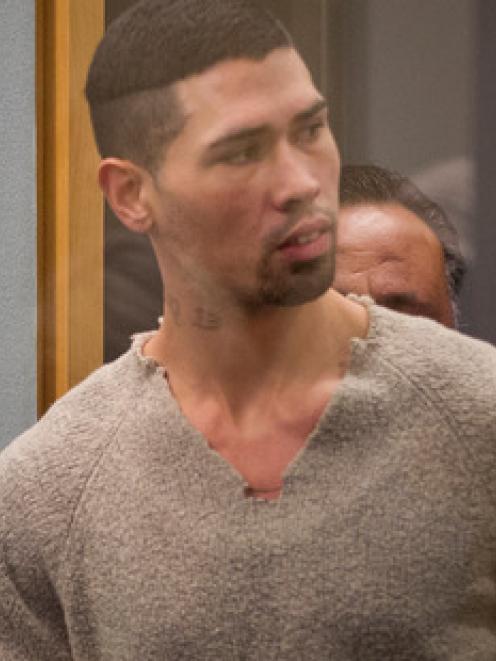
Robertson was freed from prison for five months before he raped and killed Blessie Gotingco. The attack happened three months after a prison psychologist assessed the convicted child kidnapper and abuser as "high risk" and likely to abduct and rape someone.
A New Zealand Herald review of Robertson's history with the justice system found no apparent gaps that allowed his release. Instead, the authorities did all they could to protect the public under the powers available at the time. A new law gives greater powers to segregate from the community the most dangerous of those released from prison.
Robertson was convicted last month of the May 2014 attack on Mrs Gotingco. He ran her down as she walked home from a North Shore bus stop in the dark and rain after a Saturday shift at Tower Insurance.
The jury accepted the Crown case that Robertson's abduction of Mrs Gotingco ended in rape and a fatal, frenzied knife attack at his Birkdale home. Her body was found dumped in a cemetery in Birkenhead.
The verdict was watched by Mrs Gotingco's grieving husband Antonio and their three children.
Rethinking Crime and Punishment executive director Ced Simpson said the justice system meant almost everyone jailed would be released eventually and former inmates needed strong support networks.
"It's in everyone's interests to put appropriate resources into information centres and community rehabilitation. Unless we execute all criminals or throw them in jail for life, then prisoners will get released."
Mr Simpson's comments were supported by clinical psychologists interviewed by the New Zealand Herald who said released prisoners needed support because isolation from the community could increase chances of re-offending.
Robertson was flagged as a danger from the moment he was sentenced aged 19 in 2006 for the abduction and indecent assault of a a 5-year-old girl.
Parole Board documents show Robertson was kept in prison for the duration of the 8-year sentence, marking his time with aggression and violence towards guards and a denial of having committed the crimes he was locked up for.
A 2010 report from the board said Mr Robertson was showing "bad behaviour and non-compliant attitudes and was a clear major risk to the safety of the community". A 2013 report, just before his release hearing, stated he had undertaken no programmes in prison to assist rehabilitation other than seven one-to-one counselling sessions the year before.
Tight conditions imposed by the board for his December 2013 release included a curfew, a ban from areas children might gather, alcohol and drug counselling and having to wear a GPS monitoring bracelet which recorded his movements.
A Parole Board transcript records Robertson as continuing to reject the crimes for which he had been imprisoned. He told the board: "It's no secret that I've maintained my innocence and my plan when I get out is to apply for an appeal to the courts."
He also said he was "100 per cent committed to sticking to" the release conditions "because I don't want to come back to jail for any reason at all".
On release, Robertson was given accommodation by the Prisoners Aid and Rehabilitation Society in central Auckland. He was convicted three weeks later for breaching his release conditions by having an overnight visitor, which his mother Maria McWatters said was his cousin. A sentence of community detention was imposed.
His second breach came on January 27 when his GPS monitoring recorded him as being inside a park. Court records show Robertson was returned to prison until Judge Roy Wade sentenced him on February 25 to two months in prison, including time served.
Ministry of Justice figures show Judge Wade's sentence was a stricter option than most judges considering breaches of release condition. Only 23 per cent of the 1150 breaches in 2014 - including those by Robertson - resulted in a return to prison.
The protection of the community was central to the sentencing notes of Judge Wade, released to the Herald. He said the Department of Corrections had obtained an Extended Supervision Order (ESO) for 10 years - the maximum period possible - including GPS tracking, which would mean Robertson was closely monitored.
He said Robertson should understand "you effectively have big brother looking at you, over your shoulder, and he will continue to do so for a very substantial period of time".
"So, what is best for you is no longer a substantial criterion. What is best for the community is what counts from now on."
The ESO was imposed by Justice Edwin Wylie at the High Court. Justice Wylie said Robertson "poses a very considerable risk indeed". "It is also clear that if he is to reoffend, the harm that would be caused to his victims would be very serious indeed."
The ESO conditions were timed to take over from his restrictive release conditions in June 2014, by which time he was back in prison facing charges over Mrs Gotingco's death.
Department of Corrections management are believed to have checked their handling of the Robertson case thoroughly and found no flaws in the management of his release. A similar check at the Parole Board is understood to have shown Robertson's release conditions to be more stringent than most applied.
A new law passed in December has given prison authorities more power to keep dangerous inmates away from the public.
Corrections can apply for Public Protection Orders (PPO) from the court for offenders with histories of serious violence or sexual offending. The orders allow Corrections to keep an inmate who has served his or her full sentence in a secure area on prison grounds.
Corrections Minister Peseta Sam Lotu-Iiga said the new orders would be used sparingly - one or two inmates up for release each year - and be targeted only at the most dangerous.
"Obviously, we're weighing up the human rights aspects of imposing a PPO with the need to protect the public from these high risk serious offenders."
By David Fisher of the New Zealand Herald












